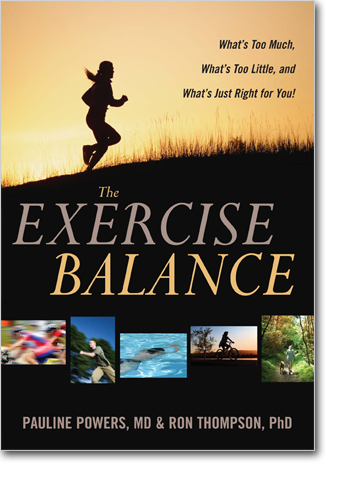
The Exercise Balance
What's Too Much, What's Too Little, and What's Just Right for You!
by Pauline Powers & Ron Thompson
The Exercise Balance
Everyone has heard the term "no pain, no gain," but some exercisers can take this mentality to the extreme. Take Billy, for example, who runs two hours on weekdays, and up to four hours on Saturdays and Sundays, regardless of injury. Excessive exercise is becoming increasingly popular, and dangerous, as people assume that "all exercise is good exercise" and they fail to realize the harm they are inflicting upon their bodies and minds. The new book, The Exercise Balance (Gürze Books, 2008), helps both over- and under-exercisers find a personal prescription for what is best for their bodies and unique situation.
Authors Pauline Powers, MD and Ron Thompson, PhD, both experts in the field of eating disorders, describe people on the extreme ends of the workout spectrum: compulsive exercisers and those who are too sedentary. Individuals with eating disorders account for a significant portion of both populations; those with anorexia nervosa often suffer from "activity anorexia" as a means to weight loss, and binge-eaters typically fail to exercise enough. The Exercise Balance provides detailed information about the characteristics and hazards of each group and provides sound medical advice for moving toward a more moderate and healthy regimen.
Although there are many other books on exercise, unique to this one is its in-depth focus on overexercise. Discussions include the Female Athlete Triad, compulsive vs. obligatory exercise, risk factors, assessment, special considerations for competitive athletes, and how to use moderation for optimum health and performance. Additionally, the authors apply exercise recommendations to Erikson's developmental stages of psychosocial development and give specific guidelines for sufferers of chronic illness.
As is the case for any type of behavioral change, the first step is gaining an awareness of the problem and admitting that it must be addressed. From there, concrete tools like personal exercise logs, journal writing, talk therapy, and relaxation skills can be used to discover a healthier, balanced level of exercise.
Powers is a professor of psychiatry specializing in obesity and eating disorders, and Thompson is a psychologist who has consulted with the NCAA and International Olympic Committee Medical Commission on overtraining. They are both avid exercisers who share their personal and professional expertise.